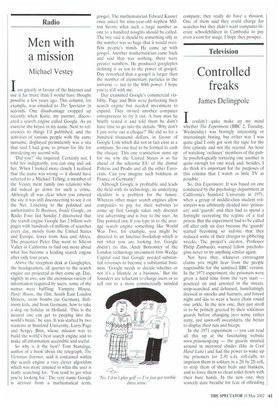I am greatly in favour of the Internet and use it
far more than I would have thought possible a few years ago. This column, for example, was emailed to The Spectator in seconds. One disadvantage cropped up recently when Katie, my partner, discovered a search engine called Google. As an exercise she keyed in my name. Next to references to things I'd published, and the activities of various people with the same surname, displayed prominently was a site that said I had gone to prison for life for murdering my second wife.
'Did you?' she inquired. Certainly not, I told her indignantly, you can ring and ask her. When I looked more closely I realised that the name was wrong — it should have referred to a Michael Telling, a member of the Vestey meat family (no relation) who did indeed go down for such a crime. Although all was clear when you entered the site it was still disconcerting to see it on the Net. Listening to the polished and authoritative In Business, Inside Google, on Radio Four last Sunday I discovered that the search engine Google has 2 billion web pages with hundreds of millions of searches every day, mostly from the United States and Europe, fewer from Asia and Africa. The presenter Peter Day went to Silicon Valley in California to find out more about what has become a leading search engine after only four years.
Above the reception desk at Googleplex, the headquarters, all queries to the search engine are projected as they come up. Day, slightly in awe, saw the enormous variety of information required by users, some of the names were baffling: Vampire House, Panic Room, the film, South East London Shiners, atom bombs (in German), Ballroom kids, and from Germany, how to take a dog on holiday in Holland. 'This is the nearest one can get to peeping into the world's brain.' he says. It was started by two students at Stanford University, Larry Page and Sergey Brin, whose mission was to build the world's best search engine and to make all information accessible and useful.
So why is it the best? Tom Standage, author of a book about the telegraph, The Victorian Internet. said it contained within the search engine a very clever algorithm which was more attuned to what the user is really searching for. 'You tend to get what you're looking for.' The very name Google is derived from a mathematical term, googol. The mathematician Edward Kasner once asked his nine-year-old nephew Milton Sirotta what such a large number as one to a hundred noughts should be called. The boy said it should be something silly as the number was so huge that it would overflow people's minds. He came up with googol. Another mathematician came back and said that was nothing, there were greater numbers. He produced googleplex defining it as ten to the power of googol. Day remarked that a googol is larger than the number of elementary particles in the universe — ten to the 80th power. I hope you're still with me.
Day examined Google's commercial viability. Page and Brin were perfecting their search engine but needed investment to expand. They invited another computer entrepreneur to try it out. A busy man he briefly tested it and told them he didn't have time to go into the details. 'Why don't I just write out a cheque?' He did so for a hundred thousand dollars, in favour of Google Link which did not in fact exist as a company. So one had to be formed to cash the cheque. This one transaction sums up for me why the United States is so far ahead of the sclerotic EU of the dismal Pattens and Prod is and all the other Eurocrats. Can you imagine such boldness in France or Germany?
Although Google is profitable and leads the field with its technology, its underlying idealism is a problem for the future. Whereas other major search engines allow companies to pay for their vvebsites to come up first Google takes only discreet text advertising and is free to the user. As Day pointed out, if you type in to the average search engine something like World War Two, for example, you might be directed to an Internet bookshop which is not what you are looking for. Google doesn't do this. Andy Bottomley of the London technology investment firm Wedge Capital said that Google needed substantial revenues to become a substantial business. `Google needs to decide whether or not it's a lifestyle or a business.' But the founders are reluctant to charge users or to sell out to a more commercially minded company: they really do have a rhission. One of them said they could charge for searches but they didn't want computer-literate schoolchildren in Cambodia to pay even a cent for usage. I hope they prosper.














































































 Previous page
Previous page